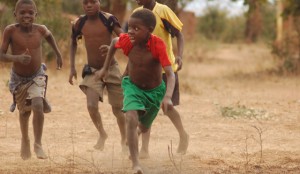From Angus Shaw in Harare, here is an inspiring article on the Positive Ladies Football Club:
Soccer is a life saver for HIV Positive Ladies
DOMBORAMWARI, Zimbabwe — For members of the Positive Ladies Football Club, playing soccer is much more than just a way to have fun.
All its members are women infected with the virus. In this impoverished district outside the Zimbabwe capital, having an outlet and a bond with teammates has helped the players keep up their spirits as they fight the disease and the stigma that goes with it.
And now is a special time for the club. It fields a team known as the ARV Swallows which will compete in a tournament in neighbouring South Africa while the World Cup is being staged.
The Swallows have already triumphed in one local women’s league, and they’ve kicked stigma and prejudice off the field at their home ground at Zinyengere government school, about 20 miles southeast of Harare, said Ivy Choga, a nurse with Medecins sans Frontieres, or Doctors without Borders, the international medical humanitarian organization.
In this southern African nation, where nearly a quarter of the adult population is estimated to be infected with the virus that causes AIDS, people with the disease were long shunned in local communities. Infected women were banished from families.
“They were hidden away and getting very sick. Families were planning burials,” Choga said.
In Domboramwari, or Stones of God in the local Shona language — named after the district’s bleak landscape of granite rocks — the “Positive Ladies” on Saturday were helping a group of their members prepare for a trip they once never dared dream of.
The Swallows are competing in a 5-a-side tournament of HIV positive women in South Africa scheduled July 2 and organized on the sidelines of the World Cup by Doctors Without Borders from its HIV treatment projects in southern Africa.
They will be led by coach Jonas Kapakasa, a former goalkeeper in a Zimbabwe club side.
“Everyone is very excited. We’re ready to show what we can do,” Kapakasa told The Associated Press.
He said he cancelled practice on Wednesday after a child of one of the Swallows became ill. Teammates rallied around to help get the child to the district hospital.
“It was a real team effort,” he said. “I’m so proud.”
AIDS groups have warned that foreign funding for life saving medication is diminishing. The so-called “Halftime” tournament in Johannesburg calls on international donors not to cut back on antiretroviral funding when the fight against the disease is only half over.
“Imagine the referee stopping the match against HIV/AIDS halfway through. … Nobody calls it quits at halftime,” Doctors Without Borders said in a statement.
In this arid Zimbabwe district, with regular power outages and no electricity at all in some parts, unemployment and food shortages are acute. Players in the Swallows grow and sell their own vegetables, some make basic handicrafts and artificial flowers from grass and scrap materials and others receive food handouts from independent charities. They receive their medication from the Dutch branch of Doctors Without Borders.
Annafields Phiri formed the team in 2008 after a Harare businessman launched a women’s football league to promote his skin and hair care products.
Choga, the nurse, said regular exercise strengthened the women and helped them throw off years of depression, discrimination and isolation. Singing and dancing goes along with their practices three times a week.
There have been injuries on the field, but neighbourhood skeptics who now turn out to support the Swallows had learned more about the risks of HIV infection from unprotected sex, often a taboo subject in Zimbabwe — and how the risk from cuts and bruises is minimal, Choga said.
Defender Nyarai Bengina, 33, said being diagnosed HIV positive in 2006 was the saddest time of her life. Seeing her drawn body, wracked by tuberculosis and near death, neighbours had taunted her to take poison to end it once and for all.
Now the beaming, smiling mother of three will soon be enjoying soccer in Johannesburg and rooting for Argentina.
“We’ve got our lives back,” she said.










